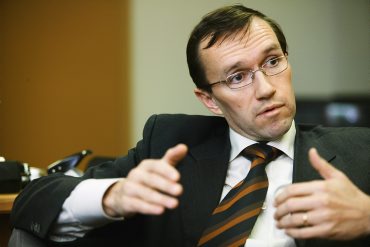After years of political pride and satisfaction over Norway’s close relations with its large neighbour to the east, concerns are now rising in the Norwegian foreign ministry. “Russia has changed” during the latest term of President Vladimir Putin, according to Norwegian Foreign Minister Espen Barth Eide.

“We must acknowledge that the role of civilian society in Russia, the part of society that’s not directly under state jurisdiction, is being restricted,” Eide told newspaper Aftenposten on Friday. “This is unfortunate, both for the residents of Russia but also for the state itself. Every state is best off when it has a free, civilian society. And then (state officials) must remember that democracy is a lot more than just arranging elections.”
Eide’s unusually frank criticism of Russian authorities in Norway’s largest newspaper illustrates the level of Norwegian concern over Russian authoritarian interference in the lives of its citizens and civilian organizations. Norwegian human rights organizations and those that have had close cooperation with Russian counterparts in recent years have noticed an emerging pattern of oppression, from the detention of members of the Pussy Riot band to crackdowns on the opposition and, most recently, the Russian Association of Indigenous Peoples of the North (RAIPON).

The latter has been an important participant in the various councils that address cooperation in the Barents region. They’re alarmed that Russian authorities suspended RAIPON’s right this autumn to meet or publicly express its views in a move that RAIPON officials (and many others involved in northern issues) believe is politically motivated. Norwegian Broadcasting (NRK) has reported how RAIPON has, for example, fought for indigenous peoples’ rights to land and water for many years. Commercial firms in Russia, however, have, without any notification to RAIPON, been allowed to buy up fishing rights in areas where natives have fished for centuries. RAIPON’s ability to protest is now severely curtailed.
The restrictions imposed on RAIPON, which prevented the organization from attending a recent meeting of the Arctic Council, particularly worry Eide, who claims that non-governmental organizations like RAIPON must be allowed to participate. The curtailment of RAIPON’s activities “affects the important ‘people-to-people’ aspect of cooperation in the Barents,” Eide told Aftenposten. “If you weaken or take away that aspect, it changes the prospects for cooperation.”
Objections lodged
Norway’s foreign ministry already has expressed its concerns to both the Russian Embassy in Oslo, to officials in Moscow and to the governor in Murmansk who recently visited Norway. Eide revealed over social media earlier this month that he personally had taken up the issue with Russia’s ambassador in Oslo.
“Now the Russians are saying that RAIPON will be able to resume its operations as soon as its status is adjusted,” Eide told Aftenposten. “Let’s hope so. It’s also good news that the charges against Ivan Mosejev (who was accused of being a Norwegian spy) have been withdrawn.” He hopes an upcoming 20th anniversary of cooperation in the Barents can be celebrated as planned early next year.
“Let me stress that it’s important for both Norway and for Russia to have good cooperation,” Eide said, adding that Russia has on many occasions shown its “modern side” in issues involving the Barents, not least when it rather suddenly agreed two years ago on territorial borders in the Barents. Norway and Russia have many common interests in the Arctic, Eide noted, as do all national and regional players in the area such as Finland, Sweden, Iceland and Denmark.
Views and News from Norway/Nina Berglund
Please support our news service. Readers in Norway can use our donor account. Our international readers can click on our “Donate” button:

